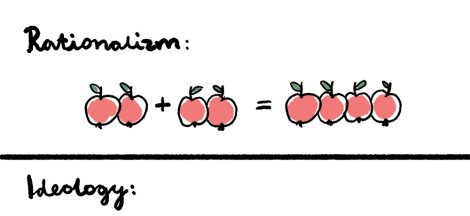
The good news is that senators have begun talking about immigration. But, as the Politico reporters noticed, “with the surge of migrants arriving at the border,” forging an agreement is unlikely. It might sound obvious, but logically, the reoccurrence of a border crisis should motivate senators to seek a solution.
The Politico reporters explained that we have an impasse because Democrats “for long pushed for (…) legal protections to undocumented immigrants brought to this country as children, (whereas) Republicans (…) won’t support anything without additional border security.” Again, we have heard it so often in different variations that we take it as a given. But, after a moment of reflection, we get it. Neither Democrats nor Republicans care to find out why we have massive illegal immigration and then eliminate it. They talk about it, but their true objective is to advance their ideological agendas.
When regular mortals face a problem, we try to identify the causes first. Politicians seem to be above tedious things like learning. They have their lofty goals. They act as though they are wise by virtue of being. For regular mortals, this is called hubris, an arrogant ignorance.
The union of American states forged in 1776 arose from humility, from the belief that a man should not control another man’s destiny. It was an assumption that society benefits the most when people are free to work on advancing themselves. In 1776, it was a belief. At the beginning of the 20th century, when the United States emerged as the world’s wealthiest nation, it was the proven science. Nevertheless, Americans tinkered with it.
Prohibition is the first example. The damage to society from the abuse of alcohol was obvious. Well-intended people wanted the government to protect Americans from their own vices. One thing led to another, and in January 1920, Prohibition became the law of the land. As we all know, it was unenforceable. By the time it was repealed in 1933, the biggest beneficiary was organized crime. It is hard to find a better example of American hubris than Prohibition.
At the same time, the newest immigrants mainly arrived from Eastern Europe. Poor and illiterate, they were perceived as being of inferior stock and thus would not likely integrate into a burgeoning American society. But, most of all, they were willing to work for less than what already established Americans wanted to get paid. That combination of racism and economic factors fueled anti-immigration sentiments. The calculation was that with fewer immigrants from impoverished countries, Americans would get better pay.

The same politicians who gave us Prohibition used the same wisdom when forming a new immigration policy, legislated in 1917-24. Prohibition was repealed, but the core provisions of our immigration policy, despite many modifications, still stand. The greatness of America the first time around was in the free movement of people. Millions tried their luck in America. Only those who succeeded stayed. Others returned to their mother countries.
American politicians a century ago ignored that simple fact. Full of hubris, they legislated immigration law to implement some abstract ideas, arrogantly disregarding the economic, social, and political conditions that motivate people to move from one country to another, temporarily or permanently. People’s migrations are part of our nature. A man’s rule can accommodate it; it cannot change it. Today’s politicians cannot accept it, just as their predecessors could not a century ago. So much has changed; hubris has stayed.
In the newly proposed U.S. Citizenship Act of 2021, one can find a myriad of abstract numbers defining how many immigrants in various categories should be allowed to come. One can ask how politicians could know how many people in each group might want to come or might be needed here in the future. The simple answer is: They do not care. Regardless of whether they are Democrats or Republicans, they have their abstract ideas. Their disagreement is in following different illusions.
By design, our immigration law ignores the most common reason for migration: seeking better economic opportunities. We have 11 million illegal immigrants because they have jobs here. It benefits them and their American employers. Purposely, our immigration law makes it cumbersome for an American employer to hire a foreigner. Neither illegal immigrants nor their employers are interested in following the law. Politico illustrates it in the article about the failure of E-Verify. Politicians have delusions they can create and enforce a law that runs counter to the interests of the people it pertains to.

Interestingly, I heard about a business that needed to fire some workers because of COVID-19. It ran E-Verify because it perfectly knew who would not pass. Politicians likely marked it as one more business following the law.
We often hear stories of aspiring immigrants struggling with the nonsense of our immigration policy. An immigrant visa officer also writes about them at Politico. For example, a grandmother who wants to spend a year or two with her American grandchildren may find it difficult to get a tourist visa but may obtain an immigration visa even though she does not need one.
The solution is not to establish a special category of visas for grandparents. The answer is to ditch the hubris in our immigration policy. We need a prudent recognition that we cannot shape human migration to satisfy our political whims. Grandparents are not the biggest problem. We may ask them for proof of health insurance, but otherwise, let them stay as long as they wish.
The biggest problem lies with accepting that immigration restrictions cannot protect American jobs. It is as easy as shielding Americans from their vices during Prohibition. If Mr. Smith prefers to hire Mr. Gonzalez from abroad instead of Mr. Jones living down the street, there is a reason for that. If the government proves effective in stopping Mr. Smith from hiring a foreigner, Mr. Jones likely will not get the job offered to Mr. Gonzalez. That job will go abroad, or Mr. Smith will scale down or move out of town. Mr. Jones will be left competing for the few jobs that cannot go away, at Walmart, McDonald’s, and the like. If Mr. Smith can get foreign workers, his business will expand, needing more local employees too. The community will grow, opening more job opportunities for Mr. Jones.
Mr. Gonzalez needs a job; he cares less about his immigration status. He wants a visa to work in the United States. If Mr. Gonzalez is disappointed with America, he may go back home after a few months or a few years, knowing that he could try again later. In the meantime, he may take English classes to improve his chances next time. If, after some time – let us say, five years of work in the United States – Mr. Gonzalez wants to make it permanent, getting a green card should be a formality. That is all that is needed to end the border crisis.
We should throw our current immigration policy into the dustbin of history, where it belongs. It helped us as much in managing immigration as Prohibition helped us in curbing alcoholism. It is high time for politicians to have the imagination, courage, and humility to declare that we are ready to accept more foreign workers. Then we could tell people crossing the border illegally today that within the next few months, there would be formal channels to apply for jobs in the United States. People now in the detention centers could be informed that their chance to find a job by staying there would be no better than if they return home. After that announcement, people crossing the border should be advised to go back home and apply for a job there.
Within a few days, we can resolve forever our antagonizing border problem. We just need less hubris and a little humility. Why is something so easy, so hard to do?



